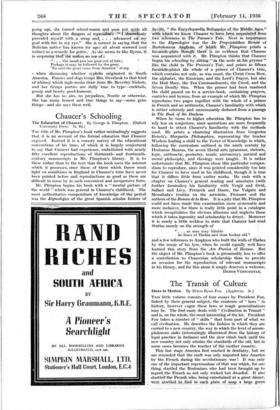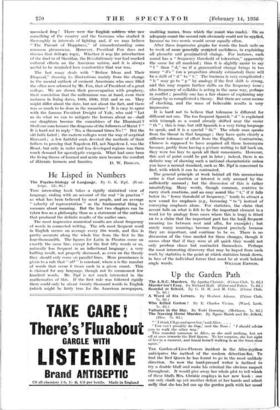The Transit of Culture
Ideas in Motion. By Dixon Ryan Fox. (Appleton. 5s.) Tins little volume consists .of four essays by President Fox, linked by their general subject, the existence of " lawS " in history, however vague these laws or 'Tough generalisations may be. The "fiist essay deals with " Civilisation in Transit " and is, on the whole, the most interesting.of the lot. President Fox takes a number of " skills " that form part of what we . call civilisation. He describes the fashion in which they are carried to a new country, the way in which the level of ac corn- plishment sinks (interestingly illustrated from the histoyy of legal practice in Indiana) and the slow climb back until the new country not only attains the standards of the old, but in some cases becomes the teacher of tile 'mother country. This last stage_ America first reached in dentistry, but we are reminded that the craft was only imported into America by the French during the revolutionary war ! It was only One of the important repercussions of that war which, for one thing, startled the Bostonians who had been brought up to regard the French as not only wicked but dwarfed. It also startled the French-who, being entertained- at a great dinner, Were stariled_to ..find in .each ..plate of soup a large green uncooked frog-! There----were--the-finglisir-soldiers -who -saw something of the country and the Germans who studied it thoroughly in intervals of fighting and, if we may believe "The Pursuit of Happiness," of misunderstanding some common phenomena, .liowever, -.President Fox does not discuss that delicate topie, Whether it a was the introduction of the duel or of Sheridan, the Revolutionary war had marked cultural effects on the American nation, and it is always useful to be reminded how constructive that war was.
The last essay deals with " Refuse Ideas and Their Disposal," drawing its illustrations mainly from the change in the mental outlook of eminent Americans who once filled the office now adorned by Mr. Fox, that of President of a great college. We are shown their preoccupation with prophecy, their conviction that the millennium was at hand, even their rashness in fixing dates, 1866, 1900, 1921 and so on. They might differ about the date, but not about the fact, and there was so much to be done in the meantime ! It is easy to agree with the famous President Dwight of Yale, who said " Let us do what we can to mitigate the horrors about us—shall our daughters become the concubines of the Illuminati ? Shall our sons become the dragoons of the followers of Marat ? " It is hard not to reply ." No, a thousand times No I " But the old faith faded ; the eastern colleges went the way of sceptical Harvard ; a few faithful souls devoted the methods of their fathers to proving that Napoleon III, not Napoleon I, was the Beast, but only in ruder and less developed regions was there much demand for apocalyptic exegesis. What had once been the living theme of learned and acute men became the comfort of illiterate farmers and fanatics. D. W. BROGAN.















































 Previous page
Previous page